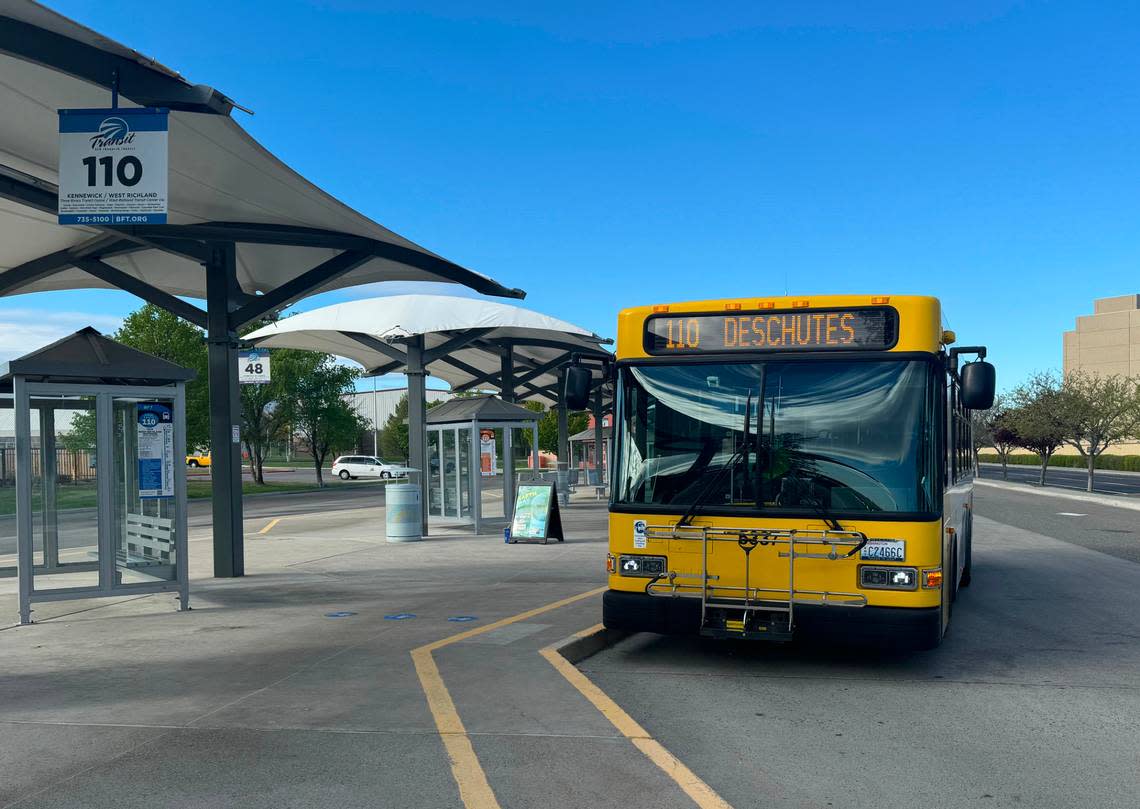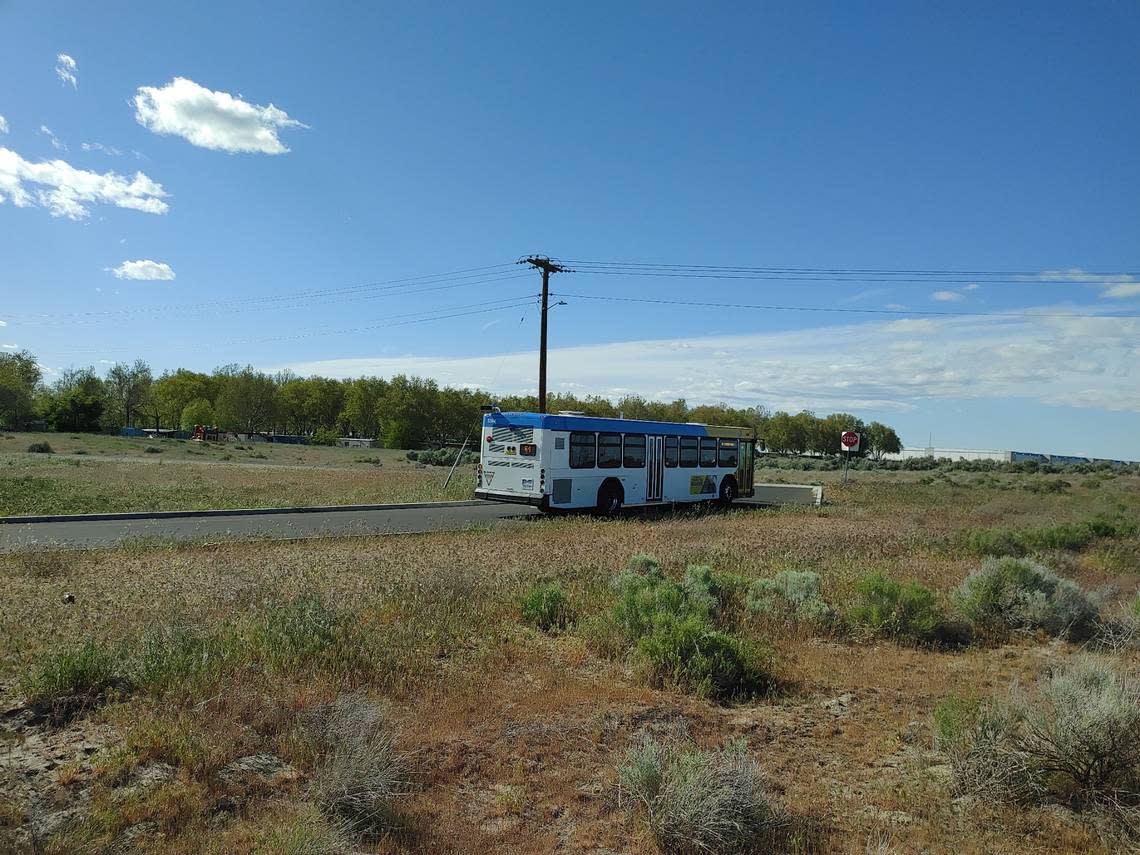Transit system breakup? Franklin County wants out of joint Tri-Cities bus service
In our Reality Check stories, journalists at McClatchy's four Washington state publications seek to hold the powerful accountable and find answers to critical questions in our community. Read more: The Bellingham Herald, The News Tribune, The Olympian, Tri-City Herald.
After another failed attempt to cut Ben Franklin Transit’s sales tax collection, Franklin County leaders are talking about breaking away from the bi-county transit system altogether.
For his entire time serving on the transit board, Commissioner Clint Didier has said cutting the voter-approved transit sales tax was a top priority. He’s not likely to get another chance for at least two years, so now Didier wants to pull Franklin County out of the joint agency.

His proposal to fellow Franklin County commissioners after the recent BFT budget fight is to cut the county out of the partnership and privatize the transit service on their side of the river.
He said they could use half of the current sales tax collection in Franklin County, or 0.3 cents. He estimates that could give them about $9 million a year from BFT’s $63 million budget to contract with their own service. He wants to create a service centered on Via offering Uber-like rides.
But Ben Franklin Transit’s financial reports show that his preferred contractor, Via, currently far exceeds the cost of running buses when it comes to the level of service they would need to replace.
While Didier is upset about the outcome of the recent transit board meeting, he went beyond just speculation when he asked the county’s legal advisors to look into the feasibility of making the split happen.
A week later, Didier reported at Wednesday’s commission meeting’s that the legal analysis points to several ways the transit partnership could be dissolved. He now wants a workshop to discuss it more, potentially setting the matter up for a November vote.
It’s unclear if Franklin County has talked with the city of Pasco about what would amount to a major change in city bus service. The city accounts for a third of BFT’s ridership.
So while Franklin County could put the issue before voters, it would have an out-sized impact on the city of Pasco, students and city-to-city commuters. The decision also could affect decisions by some businesses considering locating in the county.
Pasco Mayor Pete Serrano declined to comment on the Didier’s proposal.
It’s a decision that could have wide-ranging economic impacts, making Pasco and Franklin county less attractive to businesses, and making travel across the Tri-Cities more complicated.
Kirk Williamson, a retired member of the Community Health Needs Assessment/Improvements Steering Committee, told the Tri-City Herald that the political grandstanding has been going on for as long as BFT has been around, and it doesn’t serve the community.
“Are we going to act like a real community of 300,000 people or are we going to continue to act like three little towns?” he said.
He believes fights like these are ignoring the toll such a decision will have on the people who rely on the transit agency.
Ben Franklin Transit budget cutting
Didier’s concern has been about getting the transit system’s growing budget under control. Even as sales tax collections have increased, the transit system’s expenses have risen at the same pace.
The transit system isn’t alone in seeing costs skyrocket though. Nearly every municipal government in the Tri-Cities is facing similar pressures to trim expenses because of rising costs.
“We are dealing with a top down agency and honestly I think we have the best chance that we’ve got right now with this board (to cut sales tax),” Didier said. “ But I’m going to ask my other commissioners to start looking into what I’ve started looking into. We are the Ben Franklin Transit and I’m thinking that maybe Franklin county needs to go our own way.”
Didier pointed to other joint county agencies that had been dissolved, such as a former Benton and Franklin clean air authority that Franklin County withdrew from in 1995.
“I figure that out of 6/10s of 1 percent in Franklin County would approximately be about $18 million, I think we could hire Via to transport all the Franklin County people and save a lot of money,” he continued.
“I think we could lower our taxes to 0.03 percent. Take it down to $9 million. There’s no reason we couldn’t move the people of Franklin County efficiently to Benton County where they can get a ride on the Benton County Transit,” Didier said at a recent commission or transit meeting.
Board chairman Rocky Mullen said he agreed with Didier and that the board should have cut the transit tax in order to convince Franklin County voters to approve a needed 0.1 cents sales tax for its failing 911 infrastructure.
A withdrawal would have massive impacts for Pasco, which is the majority of Franklin’s population at an estimated 83,000 of the county’s 96,000 residents.
The transit agency’s service and sales tax collection area in Franklin County is almost entirely within Pasco and its urban growth area.
The attempt to put a sales tax on the ballot failed on April 11 because the BFT board agreed to wait to see if the state’s controversial carbon tax was going to be repealed by voters, triggering a potential $6 million annual loss for the transit agency.
Cutting the sales tax by 0.1 cents would have caused them to lose the carbon funding, whether or not it’s repealed, and cost an additional estimated $130 million over 13 years.
Can Franklin County make transit decision for Pasco?
There are three methods of dissolving a transit system in Washington, according to Franklin County’s legal analysis.
The most common is a majority approval from voters within the service area. In this case, it would likely be their service area in Franklin County, leaving a vote of mostly Pasco residents.
The system could be broken up by a joint resolution of the participating municipalities or through terminating key interlocal agreements.
By joint resolution of the county and its participating city components.
Areas like Kahlotus, Connell and Mesa do not collect the 0.6 cents sales tax to pay for transit service, according to the state auditor’s office. But those residents do pay sales tax if they shop in Pasco, Kennewick or Richland.
Pasco riders account for about one-third of all BFT bus rides each day. That’s an average of 2,700 rides per day or more than 815,000 a year, according to the most recent BFT rider data.
The transit agency’s fixed-route ridership recovered and exceeded pre-COVID boardings last year, with a peak of nearly 315,000 fixed-route boardings across the Tri-Cities in October and a total of 2.45 million boardings in 2023.
Their total boardings across all services reached nearly 3.2 million.
More than 70% of fixed-route bus riders said they use the service daily, according to a BFT survey presented to the board last year.
Who will it impact?
While Franklin County could put the issue before voters, the biggest impact would be on Pasco riders and city-to-city commuters.
It would also have a major impact on public school students, who accounted for about 1 million rides last year.
Raul Sital, Pasco School District’s assistant superintendent for operations, recently told the transit board that their students rely on BFT to get home from after school activities, to get to and from recreational activities and help working parents know their children are getting home safely.
It also ensures students can get to choice schools that do not have fixed boundaries, such as the district’s upcoming career and technology high school.
“Many families rely on Ben Franklin Transit out of necessity, not convenience,” Sital said. “Sustaining funding for BFT isn’t about maintaining bus routes, it’s about upholding values of equity and access, ensuring everyone in our community has the means to thrive.”
Williamson said he’s concerned that Franklin county isn’t looking at the impact a decision like this will have on the lives of the people who use the service.
“Having a good, solid public transportation system as we continue to grow will be more and more advantageous for this community.”
He’s concerned that these drastic cuts would have a huge impact on the health and well being of the people who rely on public transit for every day needs such as getting across the Tri-Cities to various medical appointments or even just going grocery shopping.
“I think it will be a disaster if we don’t have public transit,” Williamson said. “I think we’ll lose medical practices who just sometimes have a terrible time with no shows and people who cant get there at the last minute.”
Pasco could choose a different path
While the Franklin County Auditor’s Office is typically the taxing authority, Washington law is clear that they don’t have to be. State law recommends the larger county manage sales tax collection and disbursement when it comes to inter-county agreements.
A city can also participate in a public transit district with a county it isn’t part of, according to Washington law.
That means if Franklin County were to call for a vote and break up BFT, Pasco could potentially create an interlocal agreement with a Benton County transit agency to manage services.
It’s unclear whether that would need to go to a public vote.
It typically just takes a petition and approval from city leaders when adding to the service area within a single county. That’s what happened when Prosser and Benton City were added to the transit service area.

What would it look like?
Franklin County pulling out of Ben Franklin Transit would have a number of cascading effects on the Tri-Cities.
Under Didier’s proposal to shift to Via’s on-demand services rather than regular buses, riders coming across the river would have get off and use the Via app to get picked up on the Pasco side of the river.
That would cost significantly more, according to BFT’s data comparing service types by cost per boarding.
Right now, Via is the least cost-efficient option in their fleet, at a cost per boarding of about $23, compared to fixed-route at just over $11 and vanpool at about $7, according to BFT’s most recent financial performance data.
Via has a more efficient cost per mile, but as you add more passengers, it does not get more efficient because buses fit more riders.
Cost per boardings for Dial-A-Ride are much higher, because they are focused on disabled riders and are subject to far more federal regulations.
Via’s services also are the only area where BFT didn’t come in under budget last year.
Despite Via only picking up about 60% of their budgeted rides, they overran what was budgeted at about $13.50 per boarding.
The transit agency budgeted $2.75 million for 205,000 Via boardings. They ended up paying $2.9 million for 127,000 boardings.
At the actual cost per boarding of nearly $23, a Franklin County only transit agency would be looking at more than $18.6 million for Pasco’s share of rides at an estimated 815,000 boardings last year.
Almost twice as much as Didier’s proposed estimated sales tax collection.
The contract update BFT recently approved for Via to take on overflow Dial-A-Ride calls was structured to bill at $57.50 per vehicle hour.
That doesn’t include any administrative fees, overhead or costs associated with facilities or property.
It’s also likely to have a huge impact on financial decisions made by businesses considering what city to locate in.
Amazon, which is hiring 1,650 new workers in Pasco, just donated two-acres of land on Sacajawea Road near its new warehouses to BFT for a transit pickup site.
The company expects significant use of bus services, to the point they not only gave the transit agency the land, but they paved a bus turn around and waiting area before deeding the property in February.
The resolution to accept the donated land notes that the company hopes it can eventually be expanded to a park-and-ride lot.

Franklin County has not been shy about the financial crisis it is facing. That crisis has been driven in large part by losing sales tax and property tax revenue to Benton County, according to a study commissioned by the county earlier this year.
Access to public transit also factors heavily into Pasco’s growth plan. According to projections, Pasco will soon be the largest municipality in the Tri-Cities, according to projections by city leaders.
Pasco expects to see about 60,000 new residents move into the city over the next 20 years as the Broadmoor development and new housing is added north of Burns Roads. Pasco’s comprehensive plan highlights Ben Franklin Transit as a key part of managing that growth and development.
Without reliable access to inter-city transportation, large employers could choose to move to Kennewick or Richland. And their potential employees may choose to stay on the same side of the river, where they wouldn’t have to switch transit agencies halfway through their trip to work.
Franklin County Commission chairman Rocky Mullen released the following letter Friday.
